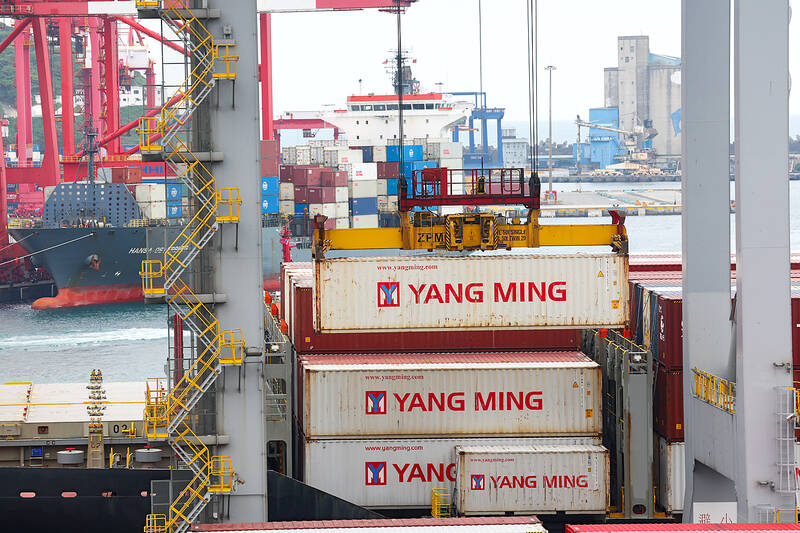Taiwan’s exports last month grew 9.2 percent from a year earlier to the second highest for a single month at US$43.59 billion, with expansion in almost all product categories, as global customers built inventory ahead of the Lunar New Year and potential tariff hikes, the Ministry of Finance said yesterday.
However, the 14-month upswing might come to a pause this month, as firms observe the nine-day Lunar New Year holiday weighing on shipments that might decline 1 to 4 percent year-on-year, Department of Statistics Director-General Beatrice Tsai (蔡美娜) said.
It is better to combine the data of January and February to gain a better understanding of real export performance, she said.

Photo: CNA
Exports in the fourth quarter of last year expanded 9.1 percent to US$125.97 billion, while exports for the whole of last year increased 9.9 percent to US$475.07 billion, both stronger than the projections in November last year by the Directorate-General of Budget, Accounting and Statistics, Tsai said.
Insatiable demand for electronics used in artificial intelligence (AI) development continued to provide business orders for local firms making chips, servers and other devices regardless of seasonality, Tsai said.
In particular, shipments of information and communications products rose 16 percent last month, 18.5 percent last quarter and 59 percent last year, the ministry’s report said.
The uptick definitely had to do with the high sales season, but some likely stemmed from rush orders intended to evade potential tariff hikes, Tsai said.
US president-elect Donald Trump has threatened to raise tariffs on all imports after his inauguration on Jan. 20, propelling shipments bound for resale in the US market before their schedule, she said.
That helped explain why exports of base metals, plastic, chemical, mineral and textile products also reported improvement, Tsai said.
Shipments of non-tech products have taken a hit from a supply glut amid listless demand in China and Europe, underlying Taiwan’s uneven recovery, Tsai said, adding that the low base last year helped fuel restocking.
Against this backdrop, Taiwan’s trade with China and Europe is losing steam, while gaining traction with the US and Southeast Asia, Tsai said.
Imports, a critical measure of exports and investment interest on the part of local firms, recorded a sharp annual increase of 30.4 percent to US$37.51 billion last month as imports of capital equipment surged 48.7 percent and semiconductor equipment advanced 53 percent from their levels the year before, the report said.
The data suggested that private investment would become a major GDP growth driver in the last quarter and beyond, Tsai said.
Taiwan recorded a trade surplus of US$6.08 billion last month, representing a 45.5 percent decline from a year earlier, the ministry said.
For the whole of last year, the trade surplus amounted to US$80.61 billion, a tiny 0.2 percent retreat annually.

Intel Corp chief executive officer Lip-Bu Tan (陳立武) is expected to meet with Taiwanese suppliers next month in conjunction with the opening of the Computex Taipei trade show, supply chain sources said on Monday. The visit, the first for Tan to Taiwan since assuming his new post last month, would be aimed at enhancing Intel’s ties with suppliers in Taiwan as he attempts to help turn around the struggling US chipmaker, the sources said. Tan is to hold a banquet to celebrate Intel’s 40-year presence in Taiwan before Computex opens on May 20 and invite dozens of Taiwanese suppliers to exchange views

Application-specific integrated circuit designer Faraday Technology Corp (智原) yesterday said that although revenue this quarter would decline 30 percent from last quarter, it retained its full-year forecast of revenue growth of 100 percent. The company attributed the quarterly drop to a slowdown in customers’ production of chips using Faraday’s advanced packaging technology. The company is still confident about its revenue growth this year, given its strong “design-win” — or the projects it won to help customers design their chips, Faraday president Steve Wang (王國雍) told an online earnings conference. “The design-win this year is better than we expected. We believe we will win

Chizuko Kimura has become the first female sushi chef in the world to win a Michelin star, fulfilling a promise she made to her dying husband to continue his legacy. The 54-year-old Japanese chef regained the Michelin star her late husband, Shunei Kimura, won three years ago for their Sushi Shunei restaurant in Paris. For Shunei Kimura, the star was a dream come true. However, the joy was short-lived. He died from cancer just three months later in June 2022. He was 65. The following year, the restaurant in the heart of Montmartre lost its star rating. Chizuko Kimura insisted that the new star is still down

While China’s leaders use their economic and political might to fight US President Donald Trump’s trade war “to the end,” its army of social media soldiers are embarking on a more humorous campaign online. Trump’s tariff blitz has seen Washington and Beijing impose eye-watering duties on imports from the other, fanning a standoff between the economic superpowers that has sparked global recession fears and sent markets into a tailspin. Trump says his policy is a response to years of being “ripped off” by other countries and aims to bring manufacturing to the US, forcing companies to employ US workers. However, China’s online warriors